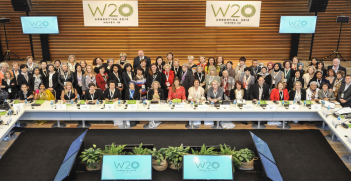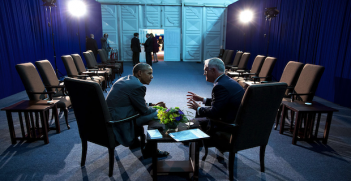Trump 100: Five Eyes Concern

Allegations that Donald Trump’s presidential campaign team colluded with Russian intelligence to influence the American election results deeply concerned allies in the Five Eyes intelligence sharing network. One hundred days into Donald Trump’s presidency, concerns about Trump’s reliability remain unresolved.
Donald Trump’s brief term as US president has so far been marked by chaos and division. Former Australian foreign minister Gareth Evans opined that Trump is “manifestly the most ill-informed, under-prepared, ethically-challenged and psychologically ill-equipped president in US history.” From his unique showmanship, to claims of “fake news”, scathing attacks on his own intelligence agencies and a series of dramatic foreign policy reversals, Trump’s presidency has been mired in controversy and uncertainty. Yet despite the damage to US-Russian relations following Trump’s recent strikes on Syria, accusations that members of Donald Trump’s campaign team had repeated contact with Russian intelligence officials continue to dog the White House.
Status of investigations
On 9 December 2016, President Barack Obama directed the US intelligence community to conduct a full review and produce a comprehensive intelligence report assessing Russian activities and intentions in the 2016 presidential election. Subsequently, dual investigations were begun by the US House of Representatives Permanent Select Committee on Intelligence (HPSCI) and the US Senate Select Committee on Intelligence (SSCI). Both committees are charged with the oversight of the US intelligence community. In a joint statement, the Republican chair and Democrat vice chair of the SSCI announced on 13 January 2017 that the committee would conduct a bipartisan inquiry of the intelligence reporting behind the intelligence community assessments from the previously released Intelligence Community Assessment Report. The committee conducted its opening hearing into Russian intelligence activities on 30 March 2017.
The HPSCI launched its own inquiry on 1 March. The highly anticipated first open hearing on 20 March 2017 saw the extraordinary cross-examination of James B. Comey, director of the Federal Bureau of Investigation (FBI) and Mike Rogers, director of the National Security Agency (NSA). At the hearing, Comey publicly confirmed that the FBI was investigating possible interference in the 2016 presidential election and any links between Russia and President Trump’s associates. Complicating matters, the chair of the HPSCI, Republican congressman and Trump transition team member, Devin Nunes, has temporarily stepped aside from the committee’s Russian investigation while he is under review by the House Ethics Committee for alleged unauthorised disclosures of classified information.
On 21 April, the HPSCI sent a letter to FBI Director Comey and NSA Director Rogers, requesting them to reappear at a closed hearing on 2 May. A second letter was sent to former CIA Director John Brennan, Director of National Intelligence James Clapper and former Deputy Attorney General Sally Yates, inviting them to appear at a later open hearing.
To date, the highest-ranking casualty has been Michael Flynn, who resigned as Trump’s national security adviser after it was revealed he misled the vice president about the substance of his conversations with the Russian ambassador before Trump’s inauguration.
US foreign relations
During the campaign, Trump, unlike his predecessors, praised Vladimir Putin as a “strong leader”. However, suspicions that links between Trump’s team and Russia signalled a change towards accommodation of Russia’s geopolitical aims have, at least for now, been put to rest. Fundamental differences between the two countries on the Syrian crisis and the US cruise missile attack on a Syrian airbase have halted any movement toward closer relations between the US and Russia. According to Trump, “we’re not getting along with Russia at all.”
Nonetheless, the accusations of links between Trump’s campaign team and Russian intelligence officials have caused anxiety among US allies, including Australia, which have viewed Russia as an adversary since the beginning of the Cold War. US allies, particularly within the Five Eyes, have questioned whether the US government remains a reliable intelligence partner. The Five Eyes comprises the US, UK, Australia, Canada and New Zealand. The intelligence network enables the US and its other members to benefit from extensive global intelligence-gathering and sharing through the worldwide satellite network. Australian spies were surely concerned by reporting in March that their American counterparts were “withholding information from the White House because of concerns it could be leaked or compromised.”
In a series of tweets in March, Trump claimed the Obama administration had wiretapped Trump Tower before the 2016 election. These claims were followed by comments made by media commentator Judge Andrew Napolitano and repeated by White House spokesman, Sean Spicer, that the UK helped former President Barack Obama “wiretap” the then President–elect Trump during the 2016 election to get around US surveillance restrictions. In response, Britain’s peak intelligence agency, the Government Communications Headquarters (GCHQ), broke with long-standing policy and issued an extraordinary rebuke to the allegations, denying any involvement and dismissing the claims as “utterly ridiculous”. The NSA chief, Mike Rogers, said such wiretapping would be a breach of the Five Eyes alliance, adding that the claim “clearly frustrates a key ally of ours.” Australia’s intelligence agencies in Canberra were reportedly “unnerved” by the dispute between Trump and the US intelligence agencies as well as the alleged Russian links.
While Trump’s presidency is still in its infancy, its actions risk a broad program of intelligence-sharing between US spy agencies and their closest counterparts in the Five Eyes network. The outlook for US foreign policy remains unpredictable. The ongoing Senate and House inquiries further compound US allies’ anxiety. Australian foreign policy and intelligence officials will be watching with great interest to see whether the US government remains a reliable partner.
Kate Grayson is an educator, a previous adviser to the late Russell Trood FAIIA and a past researcher on intelligence oversight and accountability.
This article is published under a Creative Commons Licence and may be republished with attribution.





